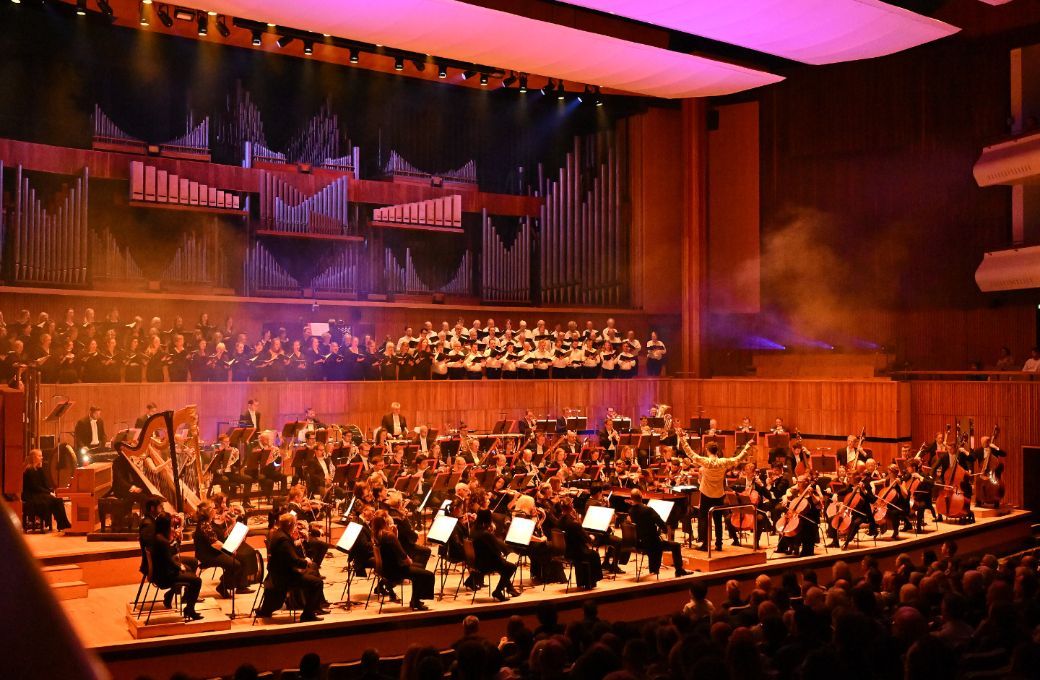A recent Los Angeles Philharmonic concert was interrupted during Tchaikovsky’s Fifth Symphony when a woman reportedly climaxed loudly during the second movement. Heaven knows what she’d have made of Prometheus, Alexander Scriabin’s strange, multisensory work that concluded the Philharmonia Orchestra’s all-Russian programme last night with an orgasmic F sharp major triad flooded in violet light.
Can you hear in colour? Alexander Scriabin could. He claimed to experience musical synaesthesia, a neurological condition or cross-sensory perception whereby he associated different tonalities with specific colours. In his Fifth Symphony, which bears the title Prometheus, Poem of Fire, Scriabin even included a part for a clavier à lumières, an instrument that would fill the concert hall in coloured light at specific moments in the score.
Quite what this “colour organ” looked like is anybody’s guess, but the stage in the Royal Festival Hall – and occasionally the Stalls too – was flooded with colour by Simon Bennison’s lighting designs in last night’s performance by the Philharmonia under Stanislav Kochanovsky. The palette switched, often quite swiftly, between mauves, pinks, infernal red, sunflower yellow and sickly green, occasionally punctuated by dancing, strobe-like spotlights and an hallucinatory haze that engulfed the audience.
Starting and ending with the hall plunged into darkness, it was certainly a theatrical realisation of Scriabin’s ambitious aims. It’s music that needs all the help it can get. Although catalogued as Scriabin’s Fifth Symphony, it falls between the stools of piano concerto and tone poem with choral finale, a trippy 22-minute, one movement work which the busy pianist – here the exemplary Alexei Volodin – gets little solo work, more of a splashy, improvisatory commentary on proceedings.

Kochanovsky, who shed his natty grey waistcoat and ascot tie for white shirt, presumably to be seen better by the orchestra, marshalled his forces expertly. Brass solos were neatly dispatched, Volodin wove magic at the piano and the concluding moments – a blaze of wordless chorus and bells bathed in purple light – hit the spot.
All three works on the programme were composed in Russia in the period of upheaval in the years leading up to the Russian Revolution of 1917. There was a Scriabin-like sense of mysticism to Anatoly Lyadov’s symphonic poem From the Apocalypse, a work inspired by verses from the Book of Revelation. The Philharmonia brass again excelled, glowering severely over tremolando strings, a whiff of Orthodox chant discernible from the woodwind choir before the doom-laden finale. A miniaturist by nature, it’s tempting to wonder what the famously lethargic Lyadov could have achieved if he’d ever tackled symphonic form.
Rachmaninov was puzzled by Scriabin’s synaesthesia (and shocked to discover that Rimsky-Korsakov shared it, although with a different colour palette). Metallic colours gleam brightly, though, in The Bells, Rachmaninov’s choral symphony inspired by Edgar Allan Poe: silver sleigh bells, golden wedding bells, mournful iron bells. Kochanovsky led a very fine account. He has a wonderfully fluid baton action and a soft, expressive left hand, shaping the musical lines elegantly, but never imposing himself forcefully on the music. The Philharmonia’s strings glowed warmly, flickering flutes tickled the palate and Rachmaninov’s ingeniously-scored bell effects rang brilliantly.
The Philharmonia Chorus provided a mighty sound in Loud Alarm Bells, their solo movement, but also backed the three soloists stoically. Toby Spence’s tenor doesn’t really have the requisite ring for this repertoire, but Anush Hovhannisyan molasses-rich soprano and Yuriy Yurchuk’s vehement baritone were ample compensation in this deeply satisfying performance.


